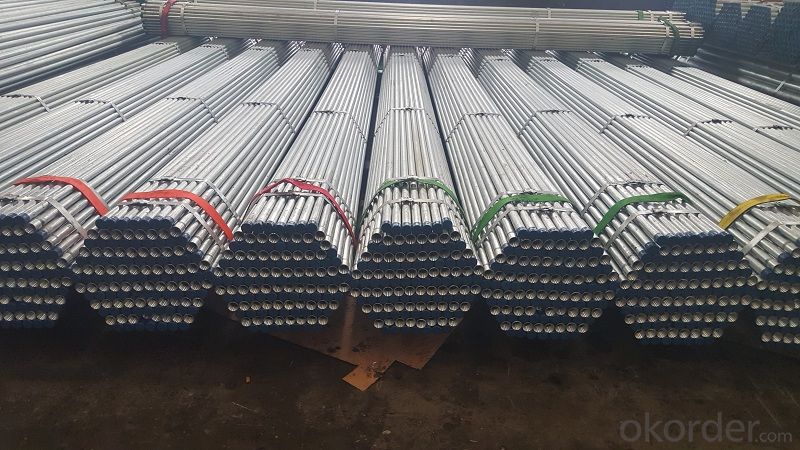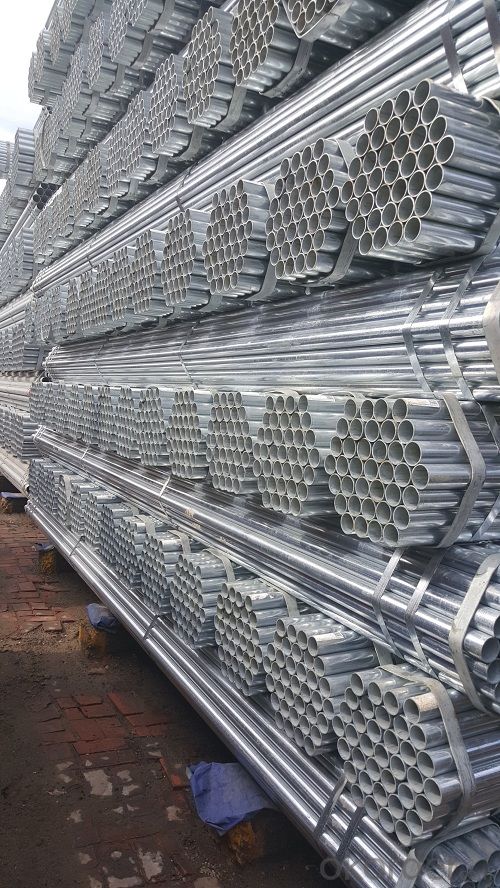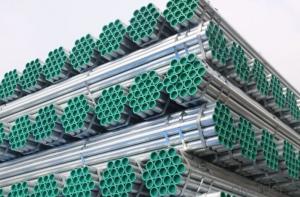High quality galvanized welded steel pipe
- Loading Port:
- Tianjin
- Payment Terms:
- TT OR LC
- Min Order Qty:
- 25 m.t.
- Supply Capability:
- 18000 m.t./month
OKorder Service Pledge
OKorder Financial Service
You Might Also Like
Item specifice
1、Structure of High quality galvanized welded steel pipe
The surface of galvanized steel pipe welded steel pipe of hot dip galvanized layer or. Galvanized can increase the corrosion resistance of the steel tube, prolong service life. Galvanized pipe is widely used, in addition to water, gas, oil and other general low pressure fluid pipelines. It is also used in the petroleum industry, especially for offshore oil field of oil well pipe and oil pipe, chemical, coking equipment of oil heater, condensation cooler, coal run oil exchanger tube, and trestle pile, the mine tunnel support frame tube.
2、Main Features of High quality galvanized welded steel pipe
:
• High manufacturing accuracy
• High strength
• Good visual effect
• Reasonable price
3、 High quality galvanized welded steel pipe Specification:
Standard | GB, DIN, ASTM ASTM A106-2006, ASTM A53-2007 |
Grade | 10#-45#, 16Mn 10#, 20#, 45#, 16Mn |
Thickness | 1 - 33 mm |
Section Shape | Round |
Outer Diameter | 21 - 610mm |
Place of Origin | Tianjin, China (Mainland) |
Secondary Or Not | Non-secondary |
Application | Hydraulic Pipe |
Technique | Cold Drawn |
Certification | API |
Surface Treatment | factory state or painted black |
Special Pipe | API Pipe |
Alloy Or Not | Non-alloy |
Length | 5-12M |
Outer Diameter | 21.3-610mm |
Grade | 20#, 45#, Q345, API J55, API K55, API L80, API N80, API P110, A53B |
Standard | ASME, ASTM |
1) Material:Q195 Q235 Q345 X42 X52
2) Specification range:OD:21.3-610mm,WT:6-70mm,length:6-12m or according to the requirement of clients.
3) Excutive standards:GB,ASME API5L.ASTM A 106/A53,Despite of the above standards,we can also supply seamless steel pipe with standard of DIN,JIS,and so on,and also develop new products according to the requirements of our clients!
4) Surface: galvanized.
5) Ends:Beveled or square cut,plastic capped,painted.
6) Packing:bundles wrapped with strong steel strip,seaworthy packing.
4、Packaging & Delivery
Packaging Details: | seaworthy package,bundles wrapped with strong steel strip |
Delivery Detail: | 15-30days after received 30%TT |
5、FAQ of High quality galvanized welded steel pipe
:
①How is the quality of your products?
Our products are manufactured strictly according to national and internaional standard, and we take a test
on every pipe before delivered out. If you want see our quality certifications and all kinds of testing report, please just ask us for it.
Guaranteed: If products’ quality don’t accord to discription as we give or the promise before you place order, we promise 100% refund.
②How about price?
Yes, we are factory and be able to give you lowest price below market one, and we have a policy that “ for saving time and absolutely honest business attitude, we quote as lowest as possible for any customer, and discount can be given according to quantity”,if you like bargain and factory price is not low enough as you think, just don’t waste your time.Please trust the quotation we would give you, it is professional one.
③Why should you chose us?
Chose happens because of quality, then price, We can give you both.Additionally, we can also offer professional products inquiry, products knowledge train(for agents), smooth goods delivery, exellent customer solution proposals.Our service formula: good quality+good price+good service=customer’s trust
SGS test is available, customer inspection before shipping is welcome, third party inspection is no problem.
6、 High quality galvanized welded steel pipe Images:


- Q:What are the different testing methods for steel pipes?
- Some of the different testing methods for steel pipes include visual inspection, ultrasonic testing, magnetic particle testing, radiographic testing, and hydrostatic testing.
- Q:What are the uses of seamless steel tubes?
- Compared withsteel and roundsteelinsolid, flexural torsional strength in the same time, the weight is light, is a kind of economic section steel, widely used in the manufacture of structural parts and mechanical parts, such as the oil pipe, automobile transmission shaft, the bicycle frame and steel construction with scaffold with steel pipe manufacturing ring parts can be improved the utilization rate of materials, simplify the manufacturing process, material saving and working hours, such as rolling bearing ring, Jack and so on, has been widely used in steel pipe manufacturing.
- Q:What does "DN25 PN16" mean?
- Steel pipe DN25, PN16, first of all, for this annotation: pipe DN class, often used in welded pipe, such as welded pipe DN25. PN16 means pressure, that is, 16 kilograms (1.6MPa).
- Q:What does "steel pipe SC" mean?
- SC (run in welded steel duitconSC is the line laying mode GB letter of wire is worn steel pipe laying (welded steel pipe, low pressure fluid) SC70 said the conductor by low pressure fluid DN70 welded steel pipe as protection pipe laying, DN70 said the nominal pipe diameter is 70mm, the nominal pipe diameter is 70mm (a series of values, the actual diameter slightly different).
- Q:How are steel pipes used in the manufacturing of shipbuilding and offshore structures?
- Steel pipes are essential components in the manufacturing of shipbuilding and offshore structures. They are widely used due to their strength, durability, and resistance to corrosion, making them ideal for the harsh marine environment. In shipbuilding, steel pipes are used for various purposes. One of the main applications is in the construction of the hull, the framework that provides structural support to the ship. Steel pipes are used to form the keel and the frames, which help to maintain the shape and strength of the hull. These pipes are welded together to create a robust and rigid structure that can withstand the forces exerted on the ship during navigation. Moreover, steel pipes are used in the construction of various systems onboard the ship. For instance, they are utilized in the piping system for transporting fluids like fuel, water, and oil throughout the vessel. Steel pipes are also employed in the ventilation and air conditioning systems, ensuring proper airflow and temperature control within the ship. In offshore structures, such as oil rigs and platforms, steel pipes play a crucial role. These structures are typically subjected to extreme environmental conditions, including severe weather, high pressure, and corrosive saltwater. Steel pipes are used to fabricate the legs, risers, and other load-bearing components of offshore structures. These pipes provide the necessary strength and stability, allowing the structure to withstand the forces exerted by waves, wind, and drilling operations. Additionally, steel pipes are utilized in the construction of subsea pipelines. These pipelines are used to transport oil, gas, and other fluids from offshore drilling sites to onshore facilities. Steel pipes are preferred due to their high tensile strength and ability to withstand the high pressure and corrosive conditions found in subsea environments. Overall, steel pipes are indispensable in the manufacturing of shipbuilding and offshore structures. Their exceptional strength, durability, and corrosion resistance make them the preferred choice for constructing hulls, systems, and load-bearing components. Without steel pipes, the construction of ships and offshore structures would be significantly compromised in terms of safety, reliability, and longevity.
- Q:How to distinguish seamless pipe and welded pipe?
- If it is seamless pipe, the port can be seen inside and outside the pipe there is no welding meat exists, and even if the welding pipe welding processing, the pipe weld is very easy to observe.
- Q:How are steel pipes used in oil and gas industry?
- Steel pipes are widely used in the oil and gas industry for various applications. They serve as the primary means of transporting oil and gas from production sites to refineries and distribution centers. Steel pipes are also used for drilling operations, providing a conduit for drilling fluids and facilitating the extraction process. Additionally, they are utilized in the construction of storage tanks, offshore platforms, and pipelines, ensuring the safe and efficient transportation of oil and gas across long distances.
- Q:How are steel pipes used in agriculture?
- Steel pipes are widely used in agriculture for various purposes. One common application is irrigation systems. Steel pipes can be used to transport water from a water source, such as a well or a reservoir, to different areas of a farm. These pipes are durable and can withstand the pressure of water, making them ideal for long-distance water transportation. Additionally, steel pipes are also used for drainage systems in agriculture. They can be used to remove excess water from fields, preventing waterlogging and ensuring proper drainage. Steel pipes are resistant to corrosion, which is important in agricultural settings where they may be exposed to moisture and various chemicals. Moreover, steel pipes are used in the construction of greenhouse structures. They provide structural support for the greenhouse framework and allow for the installation of irrigation systems and other equipment. Steel pipes are strong, sturdy, and can withstand harsh weather conditions, making them suitable for greenhouse construction. Furthermore, steel pipes are utilized in livestock farming. They are commonly used to create fences and enclosures for animals, providing a secure and durable barrier. Steel pipes are also used in the construction of animal shelters and barns. In summary, steel pipes play a crucial role in agriculture. They are used for irrigation systems, drainage systems, greenhouse construction, and livestock farming. Their durability, strength, and resistance to corrosion make them an excellent choice for various agricultural applications.
- Q:What are the different types of threading on steel pipes?
- The different types of threading on steel pipes include tapered threads, straight threads, and buttress threads. Tapered threads are commonly used for pipes that will be screwed into fittings, while straight threads are typically used for pipes that will have a coupling or union attached. Buttress threads are designed for heavy-duty applications and provide increased strength and resistance to axial loads.
- Q:What is the difference between steel pipes and FRP pipes?
- Steel pipes and FRP (Fiber Reinforced Plastic) pipes are two different types of pipes that are commonly used in various industries and applications. Here are the key differences between the two: 1. Material Composition: Steel pipes are made of steel, which is an alloy of iron and carbon, with additional elements like manganese, silicon, and traces of other metals. On the other hand, FRP pipes are composed of a polymer matrix reinforced with fibers, such as glass or carbon fibers. 2. Strength and Durability: Steel pipes are known for their high strength and durability. They can withstand high pressures, heavy loads, and extreme temperatures. FRP pipes, although strong and durable, are comparatively lighter in weight and may not have the same level of strength as steel pipes. However, they are corrosion-resistant and have a longer lifespan in corrosive environments. 3. Corrosion Resistance: Steel pipes are prone to corrosion and require protective coatings or linings to prevent rust and deterioration. FRP pipes, on the other hand, are inherently corrosion-resistant. They do not require additional coatings and are suitable for transporting corrosive fluids or operating in corrosive environments. 4. Installation and Maintenance: Steel pipes require specialized welding or threading techniques for installation. They can be more labor-intensive and time-consuming to install, especially in complex or large-scale projects. FRP pipes, on the other hand, are lightweight and can be easily transported and installed. They often come in pre-fabricated sections, making installation faster and less labor-intensive. Additionally, FRP pipes require minimal maintenance compared to steel pipes. 5. Cost: Steel pipes are generally more expensive than FRP pipes due to the higher cost of raw materials and the need for additional corrosion protection measures. FRP pipes offer a cost-effective alternative, especially in applications where corrosion resistance is essential, as they eliminate the need for expensive coatings or linings. Overall, the choice between steel pipes and FRP pipes depends on the specific requirements of the application. Steel pipes are preferred for their high strength, while FRP pipes offer benefits such as corrosion resistance, lightweight, and cost-effectiveness.
1. Manufacturer Overview |
|
|---|---|
| Location | |
| Year Established | |
| Annual Output Value | |
| Main Markets | |
| Company Certifications | |
2. Manufacturer Certificates |
|
|---|---|
| a) Certification Name | |
| Range | |
| Reference | |
| Validity Period | |
3. Manufacturer Capability |
|
|---|---|
| a)Trade Capacity | |
| Nearest Port | |
| Export Percentage | |
| No.of Employees in Trade Department | |
| Language Spoken: | |
| b)Factory Information | |
| Factory Size: | |
| No. of Production Lines | |
| Contract Manufacturing | |
| Product Price Range | |
Send your message to us
High quality galvanized welded steel pipe
- Loading Port:
- Tianjin
- Payment Terms:
- TT OR LC
- Min Order Qty:
- 25 m.t.
- Supply Capability:
- 18000 m.t./month
OKorder Service Pledge
OKorder Financial Service
Similar products
New products
Hot products
Related keywords





























